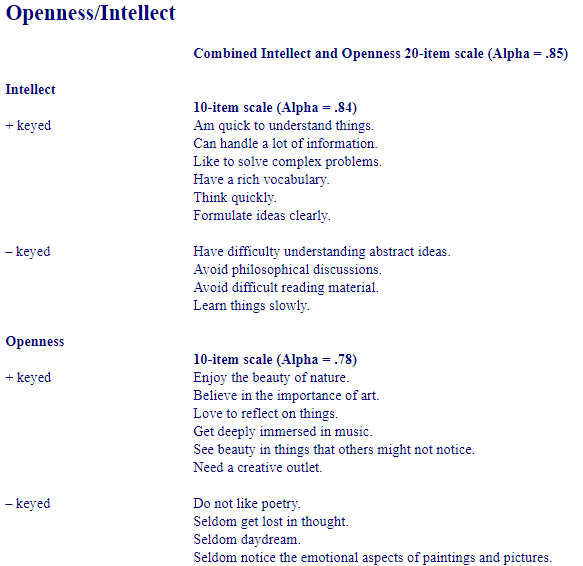Openness
Why Liberals Are More Open to Experience Than Conservatives
Conservatives are not more simple-minded than liberals.
Posted December 12, 2020
There is considerable evidence that people’s political views are related to their personality traits to some extent (Sibley et al., 2012). One of the most consistent findings is that conservatives are lower than liberals on openness to experience, a trait related to the richness and complexity of one’s mental life. Discussion of individual differences based on political views has led to heated arguments including, on the one hand, unflattering claims that conservatives are more dogmatic and simple-minded than liberals, and on the other, that measures of openness to experience simply reflect liberal bias. However, more recent research suggests that the truth is more nuanced than either of these extremes. For example, a study found that greater political sophistication increases differences between liberals and conservatives on openness to experience, although this applies more to the experiential than the intellectual aspects of this trait (Osborne et al., 2017). Hence, lower openness to experience in conservatives more likely reflects a preference for the familiar than simple-mindedness or lack of intellectual acuity.

Within social psychology, there has been a persistent belief that liberals are more complex thinkers than conservatives, which is manifested in differences in measures of dogmatism, need for closure, integrative complexity, and even openness to experience (Conway et al., 2016). However, Conway et al. (2016) showed that, while conservatives were more dogmatic about some topics (e.g., religion), liberals were more dogmatic about others (e.g., environmentalism), where dogmatism was defined in terms of excess certainty and an attitude that only fools would disagree with one’s own views. Additionally, Conway et al. conducted another study to assess integrative complexity in which participants were asked to complete questions that mostly concerned political and social issues (e.g., “death penalty,” “abortion,” and “organized religion”). Their answers were rated for integrative complexity by trained coders who were unaware of the writer’s political orientation. Results showed that conservatives manifested greater integrative complexity on some issues (e.g., the death penalty, socialism), while liberals had greater integrative complexity on others (e.g., censorship, pre-marital sex). The authors concluded that conservatives are not less cognitively complex in general, but that differences between liberals and conservatives depend on the specific topic. Additionally, they found that people who had stronger feelings about particular topics tended to be more dogmatic about them.
Just as differences between liberals and conservatives on complexity seem to be nuanced, it is worth considering that differences between them in personality traits like openness to experience might be nuanced as well. Openness to experience is a complex trait that encompasses a wide range of characteristics related to a person’s mental life, e.g., interest in abstract ideas, creativity, appreciation of beauty, emotional depth, richness of fantasy and imagination, and preference for novelty. Various ways of measuring the trait have been developed, among which the most famous is used in the NEO Personality Inventory-Revised (Costa & McCrae, 2008), which proposed that the broad factor of openness to experience consisted of six narrower facets of ideas, feelings, aesthetics, fantasy, values, and action. The Values facet proved controversial because it contains statements that explicitly reflect conservative or liberal views.
For example, endorsing the statement, “I believe that we should look to our religious authorities for decisions on moral issues,” which reflects a conservative position, is seen as indicating low openness. This has led to charges that the apparent relationship between openness to experience and liberalism is circular and therefore meaningless, that is, liberals score higher on measures of openness to experience because the measures being used include explicit political content (Charney, 2015; Konnikova, 2016).
However, alternative measures of openness to experience that do not include political content have been available for many years, and studies using these measures continue to find a robust relationship between this trait and having liberal vs. conservative political views (e.g. Osborne et al., 2017; Osborne and Sibley, 2015). For example, in the Big Five Aspect Scale, in which each of the broad Big Five traits is considered to consist of two narrower aspects, openness to experience has two aspects of “intellect” (which relates to mental acuity and cognitive engagement) and “openness” (which relates to the experiential and perceptual features of the trait such as imagination/fantasy and aesthetic appreciation). The items used to measure these two aspects are shown in the table below. As can be seen, neither aspect includes explicitly political content.

Osborne et al. (2017) argued that liberals and conservatives are more likely to differ in the openness aspect rather than the intellect aspect of openness to experience. This is because a core feature of conservatism is a preference for the status quo, whereas openness is related to preference for novelty and change, which is incompatible with conservative values.
Additionally, they argued that differences between conservatives and liberals in this trait would increase in people with greater political sophistication. This is because people who are more knowledgeable about politics would be better able to make informed decisions about which political views are more aligned with their own personality inclinations. Osborne et al. (2017) used the Big Five Aspect Scale to test this in a study in New Zealand, in which participants completed a questionnaire assessing their knowledge of current political events, as well as indicating their political orientation on a scale ranging from extremely liberal to extremely conservative. As predicted, they found that the openness aspect was significantly associated with higher liberalism, whereas there were no significant differences between conservatives and liberals in the intellect aspect. Furthermore, they found that differences between conservatives and liberals in the openness aspect were more pronounced in those with higher rather than lower political sophistication. This finding is in line with prior research showing that greater knowledge and education tend to polarize people’s views on controversial issues (Drummond & Fischhoff, 2017), perhaps because people who are more sophisticated feel more confident in defending their preferred views.
In summary, differences between conservatives and liberals in openness to experience are not likely to be simply an artifact of biased measures, as they are still found even when using measures that lack political content. On the other hand, such differences are also unlikely to reflect simple-mindedness among conservatives because the differences are accentuated by greater sophistication. Furthermore, such differences appear to be in the experiential and perceptual aspects of openness to experience rather than in mental acuity and capacity for abstract thought. Hence, it might be reasonable to conclude that liberals are more imaginative than conservatives but not necessarily more able to handle complex information. Whether this is desirable or undesirable might depend on how much personal importance one places on this feature of personality.
© Scott McGreal. Please do not reproduce without permission. Brief excerpts may be quoted as long as a link to the original post is provided.
References
Charney, E. (2015). Liberal bias and the five-factor model. Behavioral and Brain Sciences, 38. https://doi.org/10.1017/S0140525X14001174
Conway, L. G., Gornick, L. J., Houck, S. C., Anderson, C., Stockert, J., Sessoms, D., & McCue, K. (2016). Are Conservatives Really More Simple-Minded than Liberals? The Domain Specificity of Complex Thinking. Political Psychology, 37(6), 777–798. https://doi.org/10.1111/pops.12304
Costa, P. T., Jr., & McCrae, R. R. (2008). The Revised NEO Personality Inventory (NEO-PI-R). In The SAGE handbook of personality theory and assessment, Vol 2: Personality measurement and testing (pp. 179–198). Sage Publications, Inc. https://doi.org/10.4135/9781849200479.n9
Drummond, C., & Fischhoff, B. (2017). Individuals with greater science literacy and education have more polarized beliefs on controversial science topics. Proceedings of the National Academy of Sciences, 114(36), 9587–9592. https://doi.org/10.1073/pnas.1704882114
Konnikova, M. (2016, August 23). Politics and Personality: Most of What You Read Is Malarkey | The New Yorker. https://www.newyorker.com/science/maria-konnikova/politics-and-personal…
Osborne, D., Dufresne, Y., Eady, G., Lees-Marshment, J., & van der Linden, C. (2017). Is the Personal Always Political? Journal of Individual Differences, 38(3), 133–143. https://doi.org/10.1027/1614-0001/a000230
Osborne, D., & Sibley, C. G. (2015). Within the Limits of Civic Training: Education Moderates the Relationship Between Openness and Political Attitudes. Political Psychology, 36(3), 295–313. https://doi.org/10.1111/pops.12070
Sibley, C. G., Osborne, D., & Duckitt, J. (2012). Personality and political orientation: Meta-analysis and test of a Threat-Constraint Model. Journal of Research in Personality, 46(6), 664–677. https://doi.org/10.1016/j.jrp.2012.08.002


